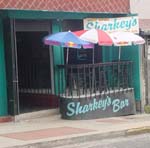|
|
|
The two traditional political party candidates survived presidential elections to face off again April 7. No candidate got the 40 percent of the votes required for election by the Costa Rica Constitution. Newcomer Ottón Solís and his Partido Acción Ciudadana made a strong showing for a new party, but placed third with about 26.3 percent of the vote. As expected, Abel Pacheco of the Partido Unidad Social Cristiana led the voting, and he got more than most pre-election polls predicted: about 38.5 percent of votes cast. But with 88 percent of the vote totaled, he was unable to reach the necessary 40 percent. Second was Rolando Araya, candidate of the Partido Liberación Nacional. He had about 31 percent of the vote cast, slightly more than some polls predicted. Solís was the target of a strong, professional constructed negative campaign waged mostly by Liberación operatives that charged he did not pay his fair share of taxes and had evicted a family from a home because they could not pay a loan they owned him. Because Solís ran on a morality and pro-tax collection campaign he was vulnerable to these attacks. He conceded about 10 p.m. Both victorious candidates addressed their troops, Araya at the Hotel Corobicí and Pacheco at the Hotel Herradura. Both urged their followers to work hard for victor. The Tribunal Supreme de Elecciones has allocated 300 million colons for the new |
election. That’s about $870.000 to print
Projections for the National Assembly show a fragmented body where no party will have a working majority. Channel 7 projected that the Social Cristiana would have about 19 deputies, Liberación 17 and Acción Ciudadana 13. The Movimento Libertario would have about 7, and Renovación Costarricense, a minor party, would have 1, the station’s analysts said. Among them would be 18 women. Pacheco carried all seven of Costa Rica’s provinces. Solís was stronger in San José, Cartago and Heredia and posted totals higher than Liberación in those provinces. He did not draw well in Limón or in Guanacaste. Otto Guevara of the Movimiento Libertario was the biggest voter-getter of the minor parties, winning 22,693 or about 1.7 percent. The percentage of the vote remained fairly constant since about 8 p.m. when the electoral tribunal began releasing numbers. So there is a consensus among the politicians that a second round of voting is certain. Abstentions approached 32 percent of the eligible voters, more than 320,000 persons. |
| Unlike the United
States where electioneering is prohibited some distance from the polling
places, the tradition here is for each party to put an informational table
or a tent just outside the school where voters go.
Here one of a handful of local parties, the Garabito
Ecologico, seeks votes for municipal candidates at the Lider Central de
Jacó school in that beach town Sunday.
|

A.M. Costa Rica photo
|
|
|
|
Elections Sunday in Costa Rica were marked by peace and tranquility, not only in the official description but in fact. Throughout the Pacific coast good feelings and a celebration of democracy was evident with Costa Ricans promoting their candidate and party with flags both on their homes and on their cars. At each polling place workers from rival parties labored side-by-side in tents and informational tables. Promotion of a candidate did not bring frowns or criticism from members of the opposite party. Some children were seen waving in the same hand flags representing the three leading candidates. At the Escuela Lider Central de Jacó election workers of each party were proud to have a |
North American drop by. "We
are having our democratic fiesta," one man said. There did not seem to
be the rivalry that is the hallmark of a polling place in the United States
during major elections.
The Tribunal Supremo de Elecciones, the fourth branch of Costa Rican government that is in charge of voting, officially verified the impressions gained in a quick tour of the Pacific. There was absolutely no problems at any polling spot in the country, the TSE and its crises committee reported. Even in the late afternoon as supporters of each party gathered at the east end of San José's Sabana Park, the mood was festive. There were no confrontations even though nearly every carload sported a flag or emblem of one of the major political parties. Supporters gathered there to await the election outcome in one giant block party. |
|
our daily digest |
|
tourism reports |
|
our back issues |
|
a news story |
|
Classified ads |
|
tourism ads |
|
real estate ads |
|
Consular info |
|
This place is a gold mine, but I'm an artist who got this place by accident. I want to draw, but not beer.
|
285 pixels by 216 (or 3 inches) And it is available! See our ad rates |

For information CLICK
HERE
|

